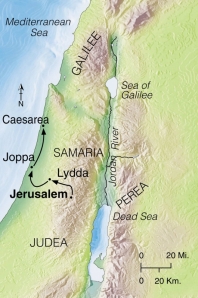
English: Ancient Roman road near Tall Aqibrin in Syria. This road connected Antioch and Chalcis. Français : Ancienne voie romaine près de Tell Aqibrin en Syrie. Elle reliait Antioche à Chalcis (Qinnasrin). (Photo credit: Wikipedia)
In verse 22, Luke writes that the apostles and the elders then chose men to go with Paul and Barnabas to Antioch, and sent a letter with them, affirming with one accord that the Gentiles were not to be burdened with the requirements that the circumcision party was trying to impose. The stipulations referred to in verses 20 and 29 were to make clear that they were to abstain from behavior that would make them appear to the world as the idol-worshipers that were so common (sexual immorality was a predominant theme in idol worship).
Paul and Barnabas stayed in Antioch (of Syria) preaching for a while, then prepared to re-visit the cities where they had been. Verse 39 describes “a sharp disagreement” between the two. Barnabas wanted to take Mark with them. But verse 38 says that “Paul thought best not to take with them one who had withdrawn from them in Pamphylia and had not gone with them to the work.” Separating, Barnabas and Mark went to Cyprus, and Paul took Silas and went through Syria and Cilicia. The Scripture does not elaborate on this, but it has been pointed out that the disagreement had the end result of making their efforts doubly fruitful.
(This year’s reading plan for Luke, Acts, and 1 and 2 Chronicles averages just 15 verses per day – 5 days per week!)
Schedule for this week
Read or listen to audio of this week’s selection from Acts here
Read or listen to audio of this weeks selection from 2 Chronicles here
/Bob’s boy
___________________
some images © V. Gilbert & Arlisle F. Beers
Please visit this site’s menu item “The Author’s Books” for info on the author’s books, website, and Facebook page.
All of my comments in this blog are solely my responsibility. When reading any commentary, you should always refer first to the scripture, which is God’s unchanging and unfailing word.









